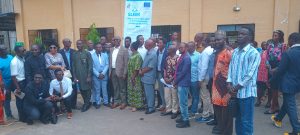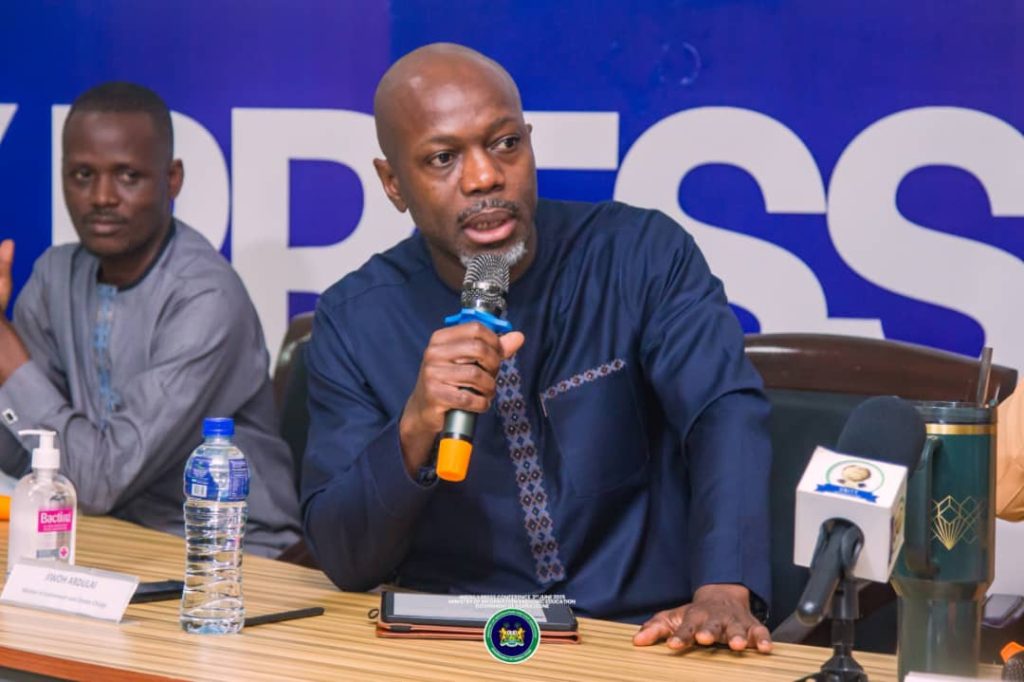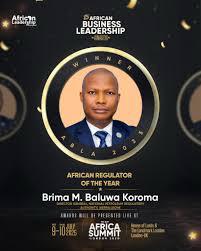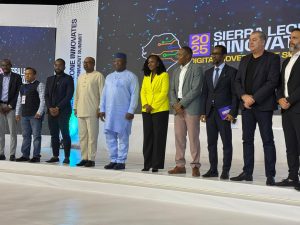LEGAL LINK Hosts Landmark National Conference on Climate Justice in SL

On September 5, 2024, LEGAL LINK organized Sierra Leone’s inaugural national conference on Climate Justice at the Africell American Corner on Bathurst Street in Freetown. This groundbreaking event was a critical platform for discussing climate change and its profound effects on vulnerable populations in Sierra Leone. The conference brought together a wide range of stakeholders, including policymakers, environmental activists, legal experts, government representatives, civil society organizations, members of the judiciary, security forces, academia, the media, and marginalized communities.
**1. Purpose and Objectives: The primary objective of the Climate Justice Conference was to stimulate a comprehensive national dialogue on climate change and its impacts. LEGAL LINK, with its mandate to defend the rights of vulnerable groups and advocate for legal and policy reforms on human rights issues, organized this event to:
Raise Awareness: Increase understanding of climate justice and its relevance to Sierra Leone’s socio-environmental landscape.
Promote Legal Reforms: Encourage discussions on necessary legal and policy changes to address climate change effectively.
Foster Collaboration: Build partnerships among diverse stakeholders to develop cohesive strategies for mitigating climate change impacts.
**2. Event Highlights: The conference was structured to provide a dynamic and interactive forum for discussion, featuring:
Keynote Speeches: Addressed the urgent need for climate justice and set the stage for subsequent discussions.
Presentations: Provided insights into the roles and responsibilities of various institutions and the current state of climate change management in Sierra Leone.
Panel Discussions: Enabled participants to engage in detailed conversations about challenges, solutions, and strategies.
Resolution Adoption: Focused on concrete actions to improve climate change management and justice in Sierra Leone.
**1. Executive Director Rashid Dumbuya’s Statement: Rashid Dumbuya Esq., Executive Director of LEGAL LINK, delivered a compelling keynote address highlighting the disproportionate impact of climate change on vulnerable populations. He emphasized:
Urgency of Action: The need for immediate measures to alleviate suffering in disaster-prone areas.
Concept of Climate Justice: The importance of addressing climate change and environmental disasters in a humane, just, and equitable manner, holding perpetrators accountable and compensating victims.
Climate Justice as a Security Issue: The broader implications of climate change, including potential security threats if not properly managed. Dumbuya urged participants to engage in candid discussions and propose actionable solutions to address climate change.
**2. Freetown City Council’s Presentation: The Climate Officer and Disaster Management Project Officer from the Freetown City Council provided a detailed presentation on:
Role of FCC: The Council’s efforts to manage and mitigate climate change disasters in the municipality.
Interventions and Challenges: Key interventions implemented by the FCC and the challenges faced, such as resource constraints and infrastructural limitations.
**3. Supreme Court Registrar Lansana Kotor Kamara’s Insights: Lansana Kotor Kamara Esq., Registrar of the Supreme Court of Sierra Leone, offered a comprehensive overview of:
Historical Context: The long-standing recognition of climate justice under international law, citing the Geneva Conventions.
Legal Framework: The necessity for Sierra Leone to ratify and domesticate international treaties related to climate change.
Judicial Role: The importance of the judiciary in interpreting laws and addressing climate change issues through the courts, despite the absence of a specialized environmental court. Kamara encouraged the use of the High Court Division on Land and Environment for environmental cases.
**4. National Disaster Management Agency’s Presentation: Representatives from the National Disaster Management Agency (NDMA) presented:
Agency’s Role: The NDMA’s involvement in managing climate change disasters across Sierra Leone.
Data and Challenges: Comprehensive data on disaster incidents in 2024 and challenges such as insufficient funding and logistical difficulties.
**5. Advocacy for Ecocide as a Core International Crime: Alpha Amadu Bah Esq. discussed:
Ecocide Concept: The need to recognize Ecocide as a fifth core international crime under the Rome Statute to ensure accountability for severe environmental harm.
Legal Framework: How existing international laws and marine laws can be utilized to prosecute environmental offenders.
**6. Student Perspective: Anthony Belmore, a final-year law student at the Faculty of Law, Fourah Bay College (FBC), highlighted:
- Impact of Climate Change: The effects of flooding on over 14,000 people in Sierra Leone.
- Proposed Solutions: Practical solutions for mitigating climate change impacts, including improved infrastructure and community engagement.
**7. Civil Society Representation: Mr. Christopher from Environmental Alert emphasized:
- Role of CSOs: The importance of Civil Society Organizations in educating and sensitizing communities about climate change and promoting positive environmental practices.
Resolutions Adopted
The conference concluded with the adoption of several resolutions aimed at addressing climate change and promoting climate justice in Sierra Leone:
- Enactment of a Climate Change and Justice Act: Establish a comprehensive legal framework to address climate change issues.
- Training and Capacity Building: Regular training for institutions involved in climate change management.
- Ratification and Domestication: Ensure international climate change treaties are ratified and incorporated into local law.
- Legal Reforms: Revise existing laws to enhance enforcement powers for climate change and environmental issues.
- Special Court: Establish a dedicated court for climate change and environmental cases.
- Polluter Pays Principle: Implement the principle to hold polluters financially accountable.
- Climate Justice Financing: Provide adequate funding for climate change management and justice initiatives.
- Education and Awareness: Launch robust educational programs on climate change for vulnerable communities.
- Citizen Watchdog Committees: Create local committees to monitor and report environmental infractions.
- School Curriculum: Incorporate climate change and environmental compliance into school curricula.
- School Clubs: Establish climate change and environmental clubs in secondary schools.
- Youth Initiatives: Support youth-led climate change initiatives across regions.
- Climate Hotline: Set up a hotline and online platforms for reporting climate-related concerns.
- Relocation: Use a human rights-based approach for relocating people from highly disaster-prone areas.
Impact and Future Outlook
The Climate Justice Conference organized by LEGAL LINK has set a significant benchmark for addressing climate change in Sierra Leone. By bringing together diverse stakeholders, the conference has:
- Facilitated Collaboration: Encouraged cooperation among different sectors to tackle climate change.
- Promoted Action: Generated actionable resolutions for addressing climate change and supporting vulnerable communities.
- Inspired Advocacy: Provided a platform for continued advocacy and policy development.
LEGAL LINK calls on the Government of Sierra Leone and relevant institutions to take decisive action in implementing the adopted resolutions. The conference has provided a solid foundation for future efforts to address climate change and ensure environmental justice.
As Sierra Leone continues to face the challenges of climate change, the insights and commitments from this conference will play a crucial role in shaping the country’s response to environmental issues. With collective resolve and collaborative efforts, there is hope for a more resilient and just approach to climate justice in Sierra Leone.





